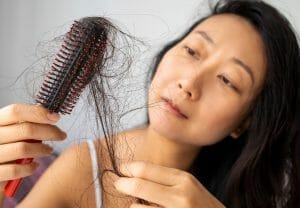Losing hair can be a very distressing and scary experience, even though unfortunately it is quite common. In fact, most people will lose hair at some point in their lifetime. Our hair is so often tied to our identities, so it’s natural to feel a range of emotions when we notice it is thinning or falling out. It can trigger anxiety, fear, depression and can lead to low self-esteem and body image issues. One of the little known side effects of some migraine medications, as reported by patients, is hair loss, and we frequently get asked questions about it in our online community. So if this is happening to you, we know that it is challenging, but you are NOT alone and it’s important to determine whether it is in fact caused by a medication you are taking, or something else altogether!
What Causes Hair Loss?

The exact cause of hair loss can be extremely difficult to pinpoint and can often be a combination of factors, making it that much harder to remedy. Common hair loss culprits include:
- Genetics
- Aging
- Hormonal imbalances and changes such as those during peri-menopause and pregnancy
- Vitamin deficiencies (Vitamins D and B, and iron among others)
- Health conditions—alopecia, thyroid disease, autoimmune diseases and others
- Side effects from medications
- Stress
- Viruses or illness
Migraine and Hair Loss
People with migraine often experience all of the above factors, which often have a bi-directional relationship with migraine disease as well. For example, physical and emotional stress can trigger migraine and also accelerate hair loss. Many health conditions that cause hair loss are also comorbid with migraine. Hormone changes throughout our lifetimes are also known migraine triggers.
In addition, hair loss is a known side effect of many migraine medications such as the CGRP monoclonal antibodies. Other medications often prescribed for migraine such as anticonvulsants, blood pressure medications and certain antidepressants can also cause hair loss. There is currently less discussion about oral CGRPs causing this side effect, but many people in the Migraine Meanderings and Hope for Migraine social media groups report they have experienced it from them also, although it appears to be much less frequent.
Migraine Medications Affect Everyone Differently
Even if hair loss is not listed as a medication side effect, it does not necessarily mean that the medication is not the cause. This is especially true for any medication that is new on the market, since post-marketing side effects can take many years to be verified and then added to medication guides. That said, it’s also important to note that not everyone who takes a drug that has this known side effect will experience it. Medications affect everyone differently, so what some people experience may be very different for others. It may also be that if the hair loss is minimal and the medication is working well, that you determine it is a “tolerable side effect” because of the benefit. If you believe you are experiencing hair loss due to a migraine medication, it’s important to report it to the FDA or call the pharmaceutical company so that it can be documented officially. Just telling your doctor about it does NOT mean it will be reported. Often, people with migraine need to make the tough decision to continue or stop a medication based on how bad the side effects are versus how effective the treatment is.
Managing Hair Loss
It’s tempting to try quick fix hair loss treatments, but it is so important to talk with your doctor before trying any products or supplements. Experimenting with products on your own can be expensive and in some cases can even cause harm if taken without a doctor’s supervision.
So what can you do?
- See a doctor who can run blood work to rule out vitamin deficiencies and/or other conditions
- Avoid heat styling and let hair air-dry as often as possible
- Use gentle hair care products that don’t over-dry hair
- Use a dry shampoo and try to wash your hair with traditional shampoo/conditioner less
- Ask your hair stylist to help you find a style that can minimize the look of thinning
- Use simple hair accessories and avoid any styles that require teasing, pulling or tight elastics
- Consider cognitive behavioral therapy if hair-loss anxiety and depression are impacting your life
- Join a support group
Since people with migraine often deal with hair loss for a host of reasons, we asked our Hope for Migraine Facebook community suggestions. They offered the following suggestions:
Supplements
- Zinc
- Selenium
- Biotin
- Collagen
- Nutrafol
- Viviscal vitamins
- Vitamin D
Shampoo, Conditioner & Scalp Treatments
- Nizoral shampoo
- Nioxin shampoo and conditioner
- Tricomin conditioning treatment spray after washing
- Monat organic shampoo
- Aveda Invati system (shampoo, conditioner, revitalizer)
- Pura’dor Therapy (shampoo, conditioner, masque)
- Rogaine (minoxidil)
- Kerinique (minoxidil)
Oils
- Eucalyptus oil and coconut oil missed together in a 1:1 ratio. Massage it into your hair then keep it on for about half an hour before washing out. Optional: wrap your head while it is on to minimize the smell & help it work
- Castor oil
- Rosemary essential oil rubbed into the scalp
Be sure to check with your doctor before trying any of these on your own. This list in no way constitutes medical advice and the Migraine Meanderings team is not specifically recommending or endorsing any of these products or brand names.
Remember that some daily hair shedding is normal, but if you are experiencing significant hair loss, you should be sure to talk to your doctor. Above all else, try to stay positive— know that your worth is not tied to your appearance and you are so much more than just your hair!